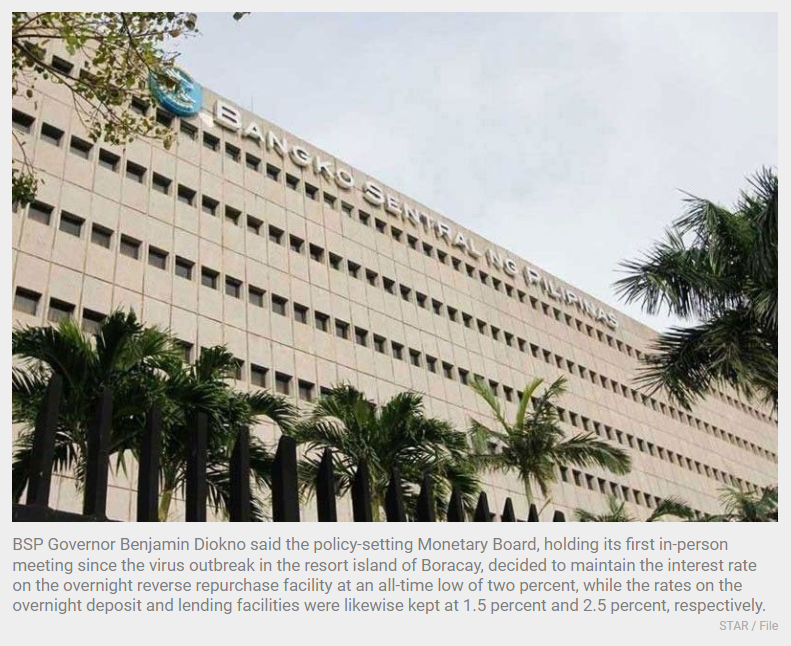Philippines: BSP keeps rates steady
MANILA, Philippines — The Bangko Sentral ng Pilipinas (BSP) kept interest rates at record lows as expected yesterday as the economy’s recovery continues to gain traction amid improved mobility due to the calibrated relaxation of quarantine measures.
BSP Governor Benjamin Diokno said the policy-setting Monetary Board, holding its first in-person meeting since the virus outbreak in the resort island of Boracay, decided to maintain the interest rate on the overnight reverse repurchase facility at an all-time low of two percent, while the rates on the overnight deposit and lending facilities were likewise kept at 1.5 percent and 2.5 percent, respectively.
This marked the eighth straight time the central bank retained the rates during its policy meeting since the surprise 25-basis-point cut in November last year.
Diokno said the potential delays in the lifting of domestic containment measures, as well as the emergence of more virulent COVID-19 variants could dampen prospects for both global and domestic demand and thus temper inflationary pressures.
“The Monetary Board also observed that economic growth appears to be gaining solid traction, driven by improved mobility and sentiment amid the calibrated relaxation of quarantine protocols and continued progress in the government’s vaccination program,” the BSP chief said.
However, Diokno said the Monetary Board noted that sustained measures to safeguard public health and welfare remain crucial to facilitate the recovery in investment and employment.
“On balance, the sum of new data suggests that there remains scope to hold monetary policy settings steady amid a manageable inflation environment. The Monetary Board maintains that keeping a patient hand on the BSP’s policy levers, along with appropriate fiscal and health interventions, will keep the economic recovery more sustainable over the next few quarters,” Diokno said.
Inflation averaged 4.5 percent from January to October as it continues to exceed the BSP’s two to four percent target since the start of the year due to supply-side shocks, which include the impact of weather-related disturbances on food prices as well as African swine fever (ASF) outbreak on meat prices. It eased to 4.6 percent in October from 4.8 percent in September.
BSP Deputy Governor Francisco Dakila Jr. said the Monetary Board decided to lower this year’s inflation forecast to 4.3 percent from the original target of 4.4 percent due to the favorable inflation outturn in September and October.
Dakila said the BSP already took into account the declining global oil prices as well as the faster-than-expected 7.1 percent gross domestic product (GDP) growth recorded in the third quarter of the year.
The BSP maintained its inflation forecast at 3.3 percent for 2022 and 3.2 percent in 2023.
Dakila pointed out inflation could ease back to within the BSP’s two to four percent target as early as November.
“There are prospects that inflation can go back to within target actually even earlier. Now it can be as early as in November, for example – that is barring any unforeseen shock coming from oil,” Dakila added.
He said significant base effects operating on inflation in the next few months would serve to drive inflation significantly downward.
“So it’s possible that inflation can return to within the two to four percent target in November and then decelerate further. Actually it is possible that it may decelerate to below the mid-point of the target range in the first quarter of next year due to negative base effects,” Dakila said.
For his part, Rizal Commercial Banking Corp. chief economist Michael Ricafort said the still relatively elevated inflation, alongside higher-than-expected third quarter GDP growth would prevent further easing of monetary policy, at the very least.
Ricafort said these developments still somewhat justify keeping the key local policy rate at record low for as long as necessary in view of the need to continuously ensure and sustain the country’s economic recovery from the COVID-19 pandemic after recent lockdowns.
“Continuation of accommodative monetary policy is also a major pillar for the country’s economic recovery program from COVID-19, as this helps in keeping short-term borrowing/financing costs relatively lower that spurs greater demand for loans that, in turn, helps in stimulating more investments as well as the creation of more jobs and generates more business activities,” Ricafort said.
He said accommodative monetary policy would still do more of the heavy lifting for the economy in view of the lack of funds for any additional stimulus measures as well as the constraints presented by the wider budget deficit and overall debt levels.
Source: https://www.philstar.com/business/2021/11/19/2142249/bsp-keeps-rates-steady


 Thailand
Thailand




